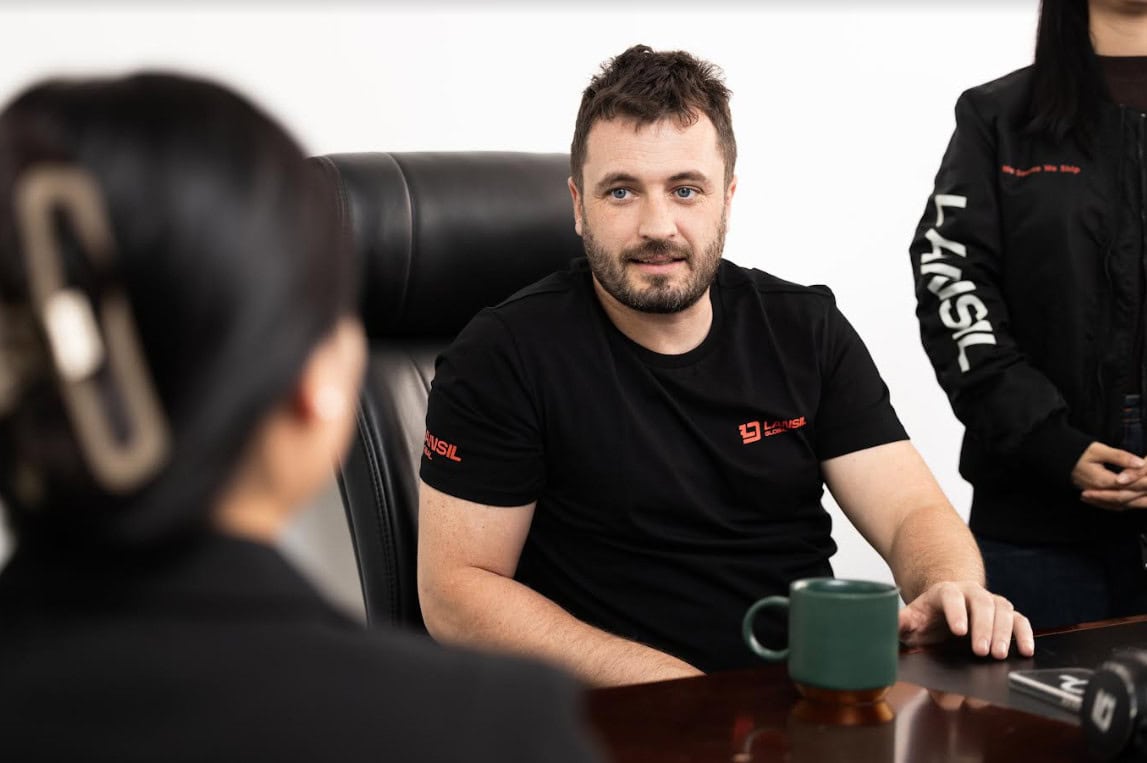Pictured: Alan Coughlan is CEO and co-founder of Lansil Global
Alan Coughlan is CEO and founder of Lansil Global
What are your main priorities and goals in your role?
My main priority is and always has been to drive organic growth of Lansil Global while maintaining high quality service. I have a trusted team of managers who oversee day-to-day operations while I focus on strategic planning, exploring new market opportunities, and supporting our worldwide expansion.
My goal is to grow Lansil Global into becoming the first choice for e-commerce businesses seeking to source quality products from China to ship across the globe.
What are your biggest challenges as CEO?
Since Lansil Global became a global company, managing teams across four different time zones has been difficult. In addition, keeping pace with the ever-evolving e-commerce industry and meeting our clients’ expectations can also prove challenging as we are always searching for new ways to improve our service, reduce lead times, and offer faster delivery. Also, opening new locations for Lansil Global brings its fair share of challenges, especially when establishing a fulfillment center in a new region. We most recently launched a base in Pennsylvania, with that came a host of logistical obstacles.
What are the challenges facing the industry going forward?
I think that the stability and growth of the industry is heavily dependent on the performance of the businesses we serve, which are mainly e-commerce brands. This in mind, I would say that the increased competition in online retail is putting more pressure on small and medium businesses. E-commerce giants such as Amazon and rising newcomers like Temu and Shein are driving away market share from independent, local retailers.
Another challenge is the increasing geopolitical tensions worldwide, including those between the US and China. Additionally, conflicts near critical trade routes, such as the Red Sea, have led to a rise in sea freight costs and increased delays.
Furthermore, the ongoing discussion between policymakers in the EU and the US about imposing additional tariffs on low-cost Chinese goods is putting more pressure on the e-commerce brands’ profit margins. Overall, free trade has long been fueling the e-commerce boom thanks to the affordable Chinese products. If tariffs and restrictions are put in place, businesses will face higher costs, leading to price increases for consumers and potential disruptions in the supply chain. This could prove challenging for all involved.
What new trends are emerging in your industry?
Like most sectors, the sourcing and shipping industry is constantly evolving. Chinese factories, for instance, are getting better at manufacturing high-quality products in larger volumes to stay ahead of emerging competitors from neighboring countries.
In addition, the rise of direct-to-consumer (DTC) shipping models is changing how e-commerce companies do business and how consumers shop online. This model is becoming so lucrative that Amazon is trying to create its own channel that offers cheap products sourced and shipped directly from China. This will enable it to compete with Temu and Shein.
Are there any major changes you would like to see in your sector?
I would like to see a more balanced approach towards implementing new technologies. I think the move to utilise technology, especially AI in every aspect of the industry, is simply happening too fast.
Constant innovation is important, but the increased use of experimental technologies can lead to inefficiencies and disruptions. The recent IT outage that occurred in July is a fine example of how a simple software error can cause global disruption.
How do you define success and what drives you to succeed?
Since we operate mainly in the B2B industry, hitting growth targets every quarter is an essential metric of our success. Numbers aside, the positive reviews we keep receiving from our clients, especially on Trustpilot, really motivate us. Knowing that our services help the businesses that we work with succeed, acts as a driver for both myself and the team to continue improving and innovating.
What have been your highlights in business over the past year?
The last 12 months at Lansil Global have seen the company reach many milestones. We have not only expanded to the US East Coast by opening a 32,000 sqft fulfillment center in Pennsylvania, but also established an office in Dubai, opened a dedicated marketing department, and have undergone major rebranding to increase our digital presence. We also recently celebrated reaching over $150 million USD in revenue.
What’s next for your company?
We plan to expand our presence across the globe by opening more fulfillment centers to accommodate the needs of our clients. Currently, we are exploring multiple locations including the US and Europe.
Where do you want your business to be this time next year?
Next year will mark the 10th anniversary of Lansil Global. We are very optimistic about the company’s future and expect more growth following our marketing efforts and recent expansion in the US.
What is the best book you’ve ever read (non-business) and why?
I’ve never really been into non-business books since my childhood. I prefer to keep myself updated by reading about the industry and following the latest trends.
What is your favourite hobby and why?
As I’m always super busy running the company, I don’t have enough time to do one particular hobby. However, when I am free, I love to spend quality time with my family. Playing with my son, going to the park, or just having days out together are among the things I find most rewarding and enjoyable.
What is your mantra for life?
It has to be, “you create your own luck.”
READ MORE CEO Q&As:
Riannon Palmer, Founder and CEO of Lem-uhn


